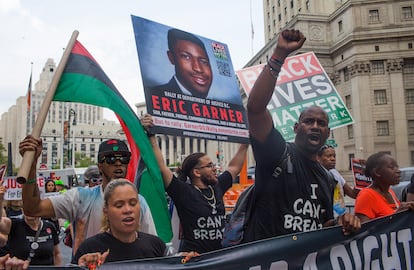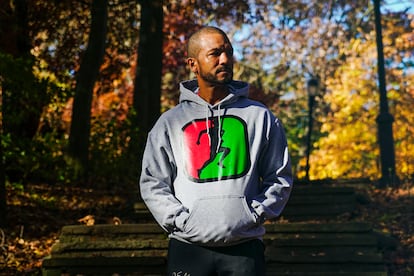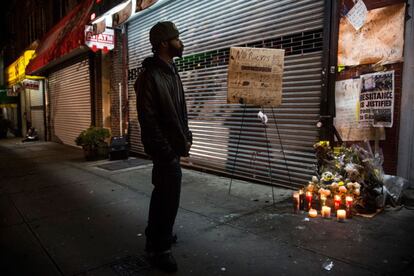Taking a breath back for Eric Garner, 10 years after his death at the hands of a New York police officer
In an interview with EL PAÍS, Jason Fulford remembers his cousin and dedicates the song ‘Taking Our Breath Back’ to him, in memory of the phrase that Eric repeated 11 times before he died: ‘I can’t breathe’


Jason Fulford doesn’t breathe the same way other people do. He is aware of the air entering and leaving his lungs. “I feel blessed to be able to take another breath,” he says, like someone who has thought a lot about the short time that goes by between being alive and being dead. Fulford is the cousin of Eric Garner, an African-American who died 10 years ago in front of a beauty supply store on Staten Island, as he begged the authorities to let him breathe. That’s what Fulford heard when he opened his Facebook page and saw his cousin on the ground, repeating the phrase “I can’t breathe” as many as 11 times, in a video that gripped New York City and the entire country, and reminded the world about police brutality against Black people in the United States.
In 2014, Fulford was a 33-year-old school teacher who had just landed in Puerto Rico. It was the summer and he was taking advantage of the break to attend a friend’s wedding. At some point, from the lobby of the hotel where he was staying, he checked his Facebook page. “I saw a video that was trending and many people were sharing it,” he recalls. “Then I looked and said, wait, that’s my cousin Eric. I immediately started receiving messages and calls from my family. I didn’t want to believe it. I still have that image in my head.”
In the video, recorded by a friend named Ramsey Orta and later shared by millions of users, Garner is seen wearing yellow shorts and a purple sweater, speaking in an exasperated tone, outside Bay Beauty Supply, surrounded by several law enforcement agents. They were arguing over the same reason that the police had charged Garner with on other occasions: illegally selling loose cigarettes on the sidewalk. An article from The New York Times states that in 2007 Garner filed a complaint in federal court accusing a police officer of conducting a cavity search of him on the street, “digging his fingers in my rectum in the middle of the street” while people passed by. Garner, who had six children and three grandchildren, was known in the Bay Street area for playing games of chess on the sidewalk and selling loose cigarettes. More than once he was seen selling near the Staten Island ferry terminal, or around Tompkinsville Park.
On July 17, 2014, the police approached Garner following a complaint from Gjafer Gjeshbitraj, a neighbor who was upset by people loitering in the neighborhood.
"Why, what did I do?" Garner asked the agents.
“Sell cigarettes,” they responded.
At some point during the argument, the officers lunged at Garner and wrestled his 6-foot-2, 395-pound body to the ground. What came next was recorded in the conscience of the Black community forever: 11 calls for help, 11 times the phrase “I can’t breathe,” without the officers paying attention. Daniel Pantaleo, 29, a member of the New York Police Department who was later found to have a history of abuse as a police officer, placed him in a chokehold that suffocated him. Garner was pronounced dead at 4:34 p.m. on July 17 at Richmond University Medical Center.

Now that he has just turned 43, Fulford can’t help but bring up certain stories that remind him how much of a presence death and violence have had in his life. Today he is the same age as Garner when he died, and the same age as Nicholas Heyward, his friend, would have been if he had not been killed by the police when he was 13 years old. Heyward lived in the Brooklyn Gowanus Houses public housing project, where Garner also grew up. On September 27, 1994, while playing cops and robbers with some friends with plastic guns, a patrol officer responded to a call, showed up, and shot Heyward in the stomach.
Two years later, in 1996, Fulford learned of the death of his cousin Emery, Garner’s brother. It’s something that almost no one knows, he says, but Eric lost one of his brothers to a gunshot in a street fight. In 2013, the family also received news of the death of Joe Flagg, Fulford and Garner’s cousin, who was shot when someone tried to rob the store where he was working in New Jersey. It was precisely at his cousin Flagg’s funeral that Fulford last saw his cousin Garner. He felt like he was protecting him. “We were at the grave, I remember him standing behind me. It was a very comforting feeling.” A year later Garner was dead. “I thought to myself how, how, how, how is it possible that my cousin, who lived his life showing everyone what a big heart he had, could be taken from us in this brutal way?” Fulford says. “It hurts to lose people you love to violence; the reality I have to deal with is hard. I feel like sometimes we don’t understand the pain that someone has to keep inside themselves.”
As the youngest cousin, Fulford had great admiration for Joe, Emery and Eric. If he had to say anything about them, he would say that they were the coolest people he ever met. They wore “cool” clothes, sported “cool” styles in their hair, and listened to “cool” music. It was everything Fulford wanted to be, but violence snuffed him out forever. Fulford does not hesitate to say that he has also been afraid for himself, a Black man from New York. “When that kind of fear is instilled in you and people who look like you, you know, it’s hard not to feel it. Historically, things tend to happen not only in my family, but to people who look like me,” he says. “But I will say that as I get older, as I grow up, I am learning not to be afraid. Fear disconnects us from the real work we could do.”
‘Taking Our Breath Back’ in honor of Eric Garner
On December 4, 2014, a Richmond County grand jury decided that Daniel Pantaleo, the officer who put Garner in a chokehold, would not be charged in the death. Although a medical examiner ruled the death a homicide, NYPD officials and officers attempted to cover up the event, attributing it to Garner’s poor health and “morbid obesity,” Stuart London, Pantaleo’s lawyer, said at the time. Garner’s death, and the jury’s subsequent decision, caused thousands of people in New York and other cities such as Chicago, Boston, Minneapolis, Atlanta and Oakland to take to the streets against police brutality. It was not until 2019, after an unstoppable five-year fight by the Garner family and civil rights groups, that Pantaleo was fired from the New York Police Department, after it was proven that he “recklessly caused injuries to Eric Garner by holding him in a prohibited chokehold for nine to 10 seconds,” the judges said.
On Wednesday, on the 10th anniversary of Garner’s death, the family has called for a march starting on Staten Island and ending at the sign that reads Eric Garner Way, on the corner of Bay Street and Victory Boulevard. Garner’s mother, Gwen Carr, has not stopped demanding justice for the death of her son and other Black people at the hands of police in the United States. “My Aunt Gwen is one of the strongest women I have ever met in my life,” Fulford says. “She has been handling this in an amazing way and making an incredible impact with the things she does.”
After Garner’s death, a series of police killings of Black people occurred: Michael Brown, 18, shot to death by an officer in Ferguson, Missouri; Walter Scott, 50, killed by another officer in North Charleston, South Carolina; Freddie Gray Jr., 25, who suffered fatal injuries while in the custody of the Baltimore Police Department. In 2020, the case of George Floyd caused people to take to the streets again despite the Covid restrictions to protest the death of another African-American, this time with the knee of a white Minneapolis officer on his neck. His last words, “I can’t breathe,” were the same ones that Eric Garner said in 2014.
“Seeing it happen to Floyd years later was very difficult,” Fulford says. “It was like reliving Eric’s murder all over again. I felt like it showed that as a society we were not taking steps forward.”

This Wednesday, in addition, Fulford debuts as a rapper. He will honor Garner’s memory along with the “Amplify Vo!ces” project by the Catalan pianist, composer and producer Albert Marquès, which aims to help people who are not musicians tell their stories. “The idea is to give a voice, to expand the voice of those who do not have it,” says Marquès, who has already extended the microphone to the African-American Keith LaMar, who has been on death row at the Ohio State Penitentiary since 1995 for a crime he says he did not commit.
Marqués and Fulford met at a public high school in Manhattan, where the former teaches and of which the latter is a former student. LaMar, and the activism they have both done to demand justice, is a cause that unites them. Some time ago Marquès invited Fulford so that this time he would be the one to take the microphone to tell his family’s story. “It was a great honor that he asked me to do that,” says Fulford, who wrote the lyrics for Taking Our Breath Back, a song that mixes hip hop, jazz and rock, and which tells the story of Eric Garner.
“I feel like I just want to honor my cousin,” Fulford says. “I feel like we all need to understand how important every breath is.” In the video, where he appears reciting the lyrics he wrote, and to which Marquès set the music, Fulford breathes and asks himself: “How long are we going to sit back, give them excuses, while we are suffocated?”
Sign up for our weekly newsletter to get more English-language news coverage from EL PAÍS USA Edition
Tu suscripción se está usando en otro dispositivo
¿Quieres añadir otro usuario a tu suscripción?
Si continúas leyendo en este dispositivo, no se podrá leer en el otro.
FlechaTu suscripción se está usando en otro dispositivo y solo puedes acceder a EL PAÍS desde un dispositivo a la vez.
Si quieres compartir tu cuenta, cambia tu suscripción a la modalidad Premium, así podrás añadir otro usuario. Cada uno accederá con su propia cuenta de email, lo que os permitirá personalizar vuestra experiencia en EL PAÍS.
¿Tienes una suscripción de empresa? Accede aquí para contratar más cuentas.
En el caso de no saber quién está usando tu cuenta, te recomendamos cambiar tu contraseña aquí.
Si decides continuar compartiendo tu cuenta, este mensaje se mostrará en tu dispositivo y en el de la otra persona que está usando tu cuenta de forma indefinida, afectando a tu experiencia de lectura. Puedes consultar aquí los términos y condiciones de la suscripción digital.








































